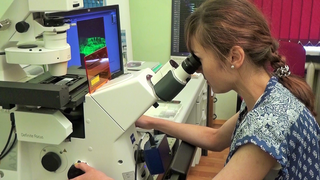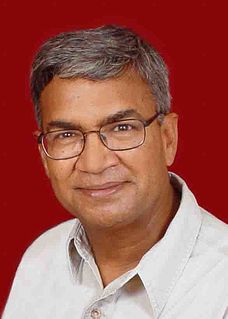
Cognitive psychology is the scientific study of mental processes such as attention, language use, memory, perception, problem solving, creativity, and reasoning.

Epistemology, or the theory of knowledge, is the branch of philosophy concerned with knowledge. Epistemologists study the nature, origin, and scope of knowledge, epistemic justification, the rationality of belief, and various related issues. Epistemology is considered a major subfield of philosophy, along with other major subfields such as ethics, logic, and metaphysics.

Empirical research is research using empirical evidence. It is also a way of gaining knowledge by means of direct and indirect observation or experience. Empiricism values some research more than other kinds. Empirical evidence can be analyzed quantitatively or qualitatively. Quantifying the evidence or making sense of it in qualitative form, a researcher can answer empirical questions, which should be clearly defined and answerable with the evidence collected. Research design varies by field and by the question being investigated. Many researchers combine qualitative and quantitative forms of analysis to better answer questions that cannot be studied in laboratory settings, particularly in the social sciences and in education.

In philosophy, empiricism is a theory that states that knowledge comes only or primarily from sensory experience. It is one of several views of epistemology, along with rationalism and skepticism. Empiricism emphasizes the role of empirical evidence in the formation of ideas, rather than innate ideas or traditions. However, empiricists may argue that traditions arise due to relations of previous sensory experiences.
Foundationalism concerns philosophical theories of knowledge resting upon non-inferential justified belief, or some secure foundation of certainty such as a conclusion inferred from a basis of sound premises. The main rival of the foundationalist theory of justification is the coherence theory of justification, whereby a body of knowledge, not requiring a secure foundation, can be established by the interlocking strength of its components, like a puzzle solved without prior certainty that each small region was solved correctly.

Reason is the capacity of consciously applying logic by drawing conclusions from new or existing information, with the aim of seeking the truth. It is closely associated with such characteristically human activities as philosophy, science, language, mathematics, and art, and is normally considered to be a distinguishing ability possessed by humans. Reason is sometimes referred to as rationality.
Deductive reasoning is the mental process of drawing deductive inferences. An inference is deductively valid if its conclusion follows logically from its premises, i.e. if it is impossible for the premises to be true and the conclusion to be false. For example, the inference from the premises "all men are mortal" and "Socrates is a man" to the conclusion "Socrates is mortal" is deductively valid. An argument is sound if it is valid and all its premises are true. Some theorists define deduction in terms of the intentions of the author: they have to intend for the premises to offer deductive support to the conclusion. With the help of this modification, it is possible to distinguish valid from invalid deductive reasoning: it is invalid if the author's belief about the deductive support is false, but even invalid deductive reasoning is a form of deductive reasoning.
Empirical evidence for a proposition is evidence, i.e. what supports or counters this proposition, that is constituted by or accessible to sense experience or experimental procedure. Empirical evidence is of central importance to the sciences and plays a role in various other fields, like epistemology and law.
Inductive reasoning is a method of reasoning in which a body of observations is considered to derive a general principle. It consists of making broad generalizations based on specific observations. Inductive reasoning is distinct from deductive reasoning. If the premises are correct, the conclusion of a deductive argument is certain; in contrast, the truth of the conclusion of an inductive argument is probable, based upon the evidence given.
Critical rationalism is an epistemological philosophy advanced by Karl Popper on the basis that, if a statement cannot be logically deduced, it might nevertheless be possible to logically falsify it. Following Hume, Popper rejected any inductive logic that is ampliative, i.e., any logic that can provide more knowledge than deductive logic. So, the idea is that, if we cannot get it logically, we should at the least try to logically falsify it, which led Popper to his falsifiability criterion. Popper wrote about critical rationalism in many works, including: The Logic of Scientific Discovery (1934/1959), The Open Society and its Enemies (1945), Conjectures and Refutations (1963), Unended Quest (1976), and The Myth of the Framework (1994).

Modern philosophy is philosophy developed in the modern era and associated with modernity. It is not a specific doctrine or school, although there are certain assumptions common to much of it, which helps to distinguish it from earlier philosophy.
Theoretical psychology is concerned with theoretical and philosophical aspects of psychology. It is an interdisciplinary field with a wide scope of study. It focuses on combining and incorporating existing and developing theories of psychology non-experimentally. Theoretical psychology originated from the philosophy of science, with logic and rationality at the base of each new idea. It existed before empirical or experimental psychology. Theoretical psychology is an interdisciplinary field involving psychologists specializing in a wide variety of psychological branches. There have been a few prominent pioneers of theoretical psychology such as Wilhelm Wundt, William James, Sigmund Freud, and John B. Watson. There has also been a number of notable contributors which include Jerome Kagan, Alan E. Kazdin, Robert Sternberg, Kenneth J. Gergen, and Ulric Neisser. These contributors may publish in a variety of journals, including journals for general psychology, like American Psychologist. There are several journals dedicated specifically to theoretical psychology, like Theory & Psychology and Journal of Theoretical and Philosophical Psychology. Many other organizations are beginning to recognize theoretical psychology as a formal subdivision of psychology.
The history of scientific method considers changes in the methodology of scientific inquiry, as distinct from the history of science itself. The development of rules for scientific reasoning has not been straightforward; scientific method has been the subject of intense and recurring debate throughout the history of science, and eminent natural philosophers and scientists have argued for the primacy of one or another approach to establishing scientific knowledge. Despite the disagreements about approaches, scientific method has advanced in definite steps.
The following outline is provided as an overview of and topical guide to epistemology:
Epistemology or theory of knowledge is the branch of philosophy concerned with the nature and scope (limitations) of knowledge. It addresses the questions "What is knowledge?", "How is knowledge acquired?", "What do people know?", "How do we know what we know?", and "Why do we know what we know?". Much of the debate in this field has focused on analyzing the nature of knowledge and how it relates to similar notions such as truth, belief, and justification. It also deals with the means of production of knowledge, as well as skepticism about different knowledge claims.
Rational fideism is the philosophical view that considers faith to be precursor for any reliable knowledge. Whether one considers rationalism or empiricism, either of them ultimately tends to belief in reason or experience respectively as the absolute basis for their methods. Thus, faith is basic to knowability. On the other hand, such a conclusion is reached not with an act of faith but with reasoning, a rational argumentation.

The Birth of the Clinic: An Archaeology of Medical Perception, by Michel Foucault, presents the development of la clinique, the teaching hospital, as a medical institution, identifies and describes the concept of Le regard médical, and the epistemic re-organisation of the research structures of medicine in the production of medical knowledge, at the end of the eighteenth century. Although originally limited to the academic discourses of post-modernism and post-structuralism, the medical gaze term is used in graduate medicine and social work.
Transcendental Humanism in philosophy considers humans as simultaneously the originator of meaning, and subject to a larger ultimate truth that exists beyond the human realm (transcendence). The philosophy suggests that the humanistic approach is guided by “accuracy, truth, discovery, and objectivity” that transcends or exists apart from subjectivity.

Miriam Solomon is Professor of Philosophy and Chair of the Philosophy Department as well as Affiliated Professor of Women's Studies at Temple University. Solomon's work focuses on the philosophy of science, social epistemology, medical epistemology, medical ethics, and gender and science. Besides her academic appointments, she has published two books and a large number of peer reviewed journal articles, and she has served on the editorial boards of a number of major journals.

Anil K. Gupta is an Indian-American philosopher who works primarily in logic, epistemology, philosophy of language, and metaphysics. Gupta is the Alan Ross Anderson Distinguished Professor of Philosophy at the University of Pittsburgh. He is also a Fellow of the American Academy of Arts and Sciences. His most recent book, Conscious Experience: A Logical Inquiry, was published by Harvard University Press in 2019.








